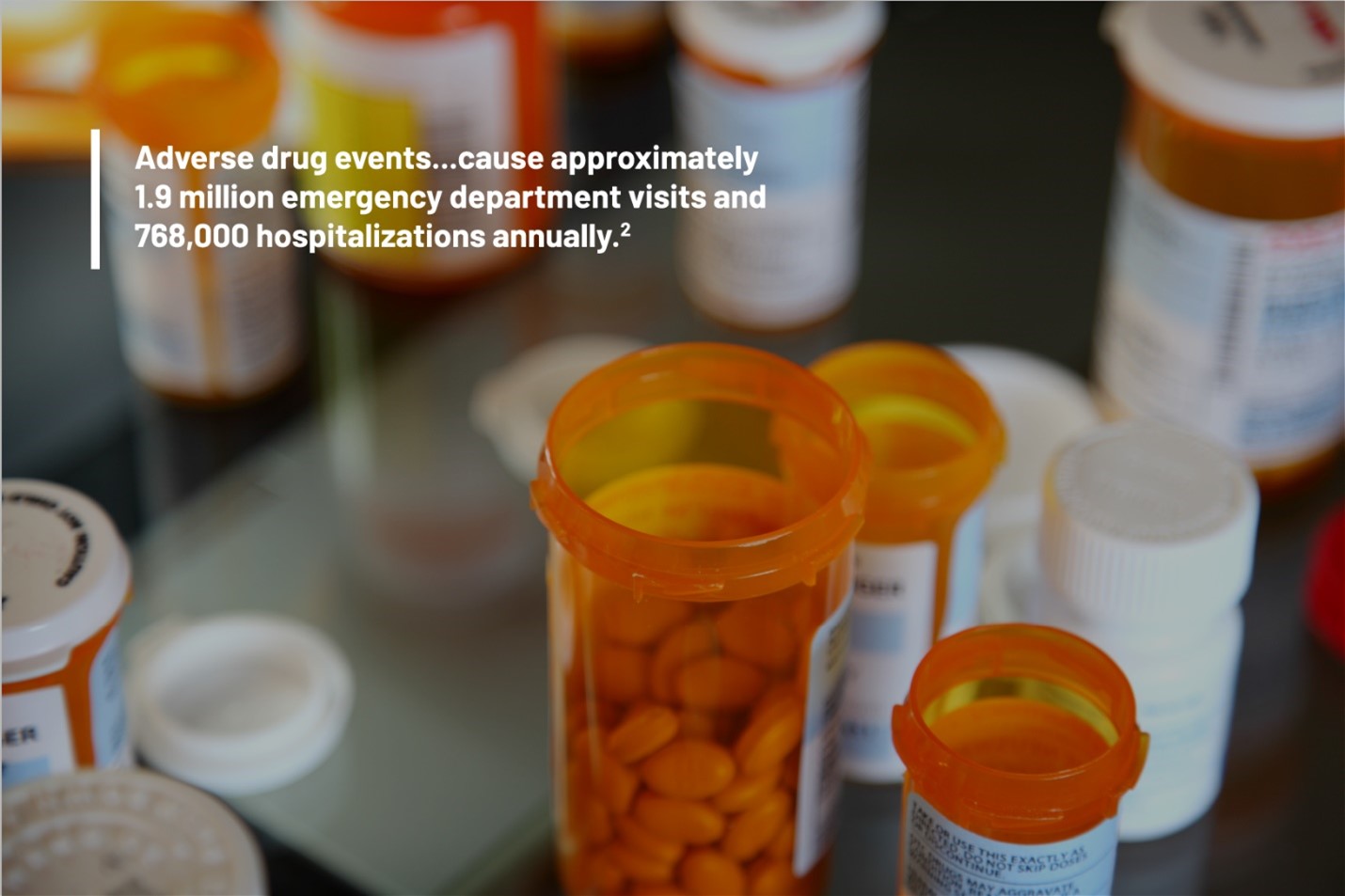Improving Care One Patient at a Time
January 7, 2025

Managing medications can be one of the most challenging aspects of daily life, particularly for patients living with multiple chronic conditions. The complexity of polypharmacy—taking five or more medications simultaneously—affects approximately 22% of Americans.1 This complexity often brings risks, including adverse drug events (ADEs). ADEs are not just medical challenges; they have a tangible human and financial cost, causing an estimated 1.9 million emergency department visits and 768,000 hospitalizations annually.2 Alarmingly, nearly 40% of these events are potentially avoidable, highlighting the need for proactive and personalized care interventions.3
At PerformRx, our Clinical Outcomes and Therapeutic Optimization programs are designed to address these challenges head-on. By offering tailored support, our team helps patients navigate their medication regimens, improving adherence, minimizing risks, and resolving potential issues before they escalate.
The Role of Comprehensive Medication Reviews (CMRs)
One of the most effective tools in our approach is the Comprehensive Medication Review (CMR). A CMR is a structured, patient-centric evaluation of a medication regimen. During a CMR, pharmacists work closely with patients to review their health history, current medications, and any barriers to adherence or understanding. This process doesn’t just address clinical concerns—it provides a holistic approach to patient care.
CMRs offer numerous benefits:
- Improved Chronic Condition Management: By optimizing medications and addressing gaps in care, CMRs help stabilize conditions like diabetes, hypertension, and heart disease.
- Reduction in ADEs: Early identification and resolution of medication-related problems prevent adverse drug events, ensuring better health outcomes.
- Enhanced Medication Adherence: Patients gain a clearer understanding of their regimens, leading to more consistent medication use.
- Increased Health Literacy: Education is a cornerstone of CMRs, empowering patients to make informed decisions about their health. 4,5,6,7
Addressing Social Determinants of Health (SDoH)
Health outcomes are shaped not only by clinical care but also by social determinants of health (SDoH). Factors such as access to transportation, food insecurity, or financial strain can significantly impact a patient’s ability to manage their medications and overall health.8
CMRs provide an opportunity to address these underlying barriers. For example, pharmacists may identify a patient who is unable to afford their prescriptions, lacks reliable transportation to pick up medications, or needs assistance accessing medical devices. By coordinating with case managers, social workers, and other resources, pharmacists can help bridge these gaps, ensuring patients receive the support they need.

A Success Story: Putting Patients First
Consider the case of a 73-year-old female patient with a complex medical history, including atrial fibrillation, chronic heart failure, diabetes, and chronic obstructive pulmonary disease (COPD). During a telephonic CMR, her caregiver shared several concerns:
- The patient’s hypertension was uncontrolled, and they were unable to monitor her blood pressure at home.
- A new prescription for furosemide wasn’t filled due to pharmacy challenges.
- Non-adherence to certain medications occurred because of processing delays.
- The patient had less symptom relief with a prescribed inhaler compared to her previous medication.
- The caregiver requested help obtaining a shower chair and exploring eligibility for a meal benefit.
Recognizing the urgency of these challenges, a PerformRx pharmacist took swift action:
- Facilitating Equipment Access: The pharmacist ensured the patient received an over-the-counter catalog to order a blood pressure monitor and scale.
- Resolving Prescription Issues: They coordinated with the pharmacy to process the vitamin D prescription and contacted the prescriber to address non-adherence and recommend alternative therapies.
- Streamlining Prior Authorizations: The pharmacist assisted with securing approval for the patient’s preferred inhaler.
- Addressing Broader Needs: A referral to case management was made to help the patient obtain durable medical equipment and assess eligibility for a meal benefit.
Outcome:
Through these interventions, many of the patient’s challenges were resolved. The patient received tools to monitor her chronic conditions, new prescriptions were processed and filled without delays, and she was connected to additional resources to support her overall well-being.
This success story underscores the value of a collaborative approach to care, where pharmacists act as key facilitators in a patient’s healthcare journey.
Scaling Impact Across Populations
The impact of PerformRx’s CMRs extends far beyond individual cases. Each year, our Clinical Outcomes and Therapeutic Optimization team engages with over 14,000 patients, identifying and resolving medication-related problems at scale. In 2021, for instance, PerformRx pharmacists identified over 22,000 medication-related problems, successfully resolving more than 10,000.
This commitment to personalized care has a ripple effect, driving improvements in population health. By addressing barriers to care, optimizing medication regimens, and focusing on SDoH, PerformRx empowers patients to achieve better outcomes while helping healthcare organizations meet their quality goals.

The Future of Personalized Pharmacy Care
PerformRx’s success in delivering tailored care through CMRs reflects a broader shift in pharmacy benefit management. As the healthcare landscape evolves, there’s an increasing emphasis on flexibility, innovation, and collaboration. By integrating clinical expertise with data-driven insights, PerformRx continues to set the standard for what a modern PBM can achieve.
However, the work doesn’t stop here. PerformRx is committed to expanding its services, leveraging new technologies, and fostering partnerships that enhance patient care. As we look to the future, our focus remains steadfast: improving care, one patient at a time.
Let PerformRx Be Your Partner in Better Care
At PerformRx, we believe every patient deserves personalized, high-quality care. Through our CMR programs and innovative clinical strategies, we help patients and healthcare partners achieve their goals.
Discover how PerformRx can transform your pharmacy benefit management strategy. Contact us today at info@performrx.com to learn more!
This blog post is a summary of an article from the Summer 2023 edition of PerformRx Review. If you enjoyed it, sign up to receive new editions and discover more content like this.
References:
- Hales CM, Servais J, Martin CB, Kohen D. Prescription Drug Use Among Adults Aged 40–79 in the United States and Canada. NCHS Data Brief. 2019;347.
- Budnitz DS, Shehab N, Lovegrove MC, Geller AI, Lind JN, Pollock DA. US Emergency department visits attributed to medication harms, 2017–2019. JAMA. 2021;326(13):1299-309. doi: 10.1001/jama.2021.13844
- Institute of Medicine. Committee on Identifying and Preventing Medication Errors. Preventing Medication Errors, Washington, DC: The National Academies Press 2006
- Zillich, A. J., Snyder, M. E., Frail, C. K., Lewis, J. L., Deshotels, D., Dunham, P., Jaynes, H. A., & Sutherland, J. M. (2014). A Randomized, Controlled Pragmatic Trial of Telephonic Medication Therapy Management to Reduce Hospitalization in Home Health Patients. Health Services Research, 49(5), 1537–1554. https://doi.org/10.1111/1475-6773.12176
- Miller E., Roane, T. E., & Mclin, K. D. (2016). Reduction of 30-day hospital readmissions after patient-centric telephonic medication therapy management services. Hospital Pharmacy, 51(11), 907-914. doi:10.1310/hpj5111-907
- Skinner, J. S., Poe, B., Hopper, R., Boyer, A., & Wilkins, C. H. (2015). Assessing the effectiveness of pharmacist-directed medication therapy management in improving diabetes outcomes in patients with poorly controlled diabetes. The Diabetes Educator, 41(4), 459-465. doi:10.1177/0145721715587563
- Pinto, S. L., Kumar, J., Partha, G., & Bechtol, R. A. (2013). Improving the economic and humanistic outcomes for diabetic patients: Making a case for employer-sponsored medication therapy management. ClinicoEconomics and Outcomes Research, 153. doi:10.2147/ceor.s40735
- Amanda Foster et al., “Addressing Social Determinants of Health in Community Pharmacy: Innovative Opportunities and Practice Models,” Journal of American Pharmacists Association, 2021.

Sign Up for Updates
Receive updates from PerformRx about the latest blog posts, news announcements, upcoming conferences and more.
Sign up